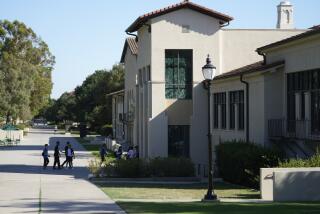Occidental’s Name Ordered on Prop. P Ads
- Share via
Political advertising aimed at persuading Los Angeles voters to support oil drilling along Pacific Coast Highway must state that the ads are paid for by Occidental Petroleum Co., a Superior Court judge ruled Monday to end a lingering dispute.
State political reform laws require that sponsors be listed in advertisements, but up to now the television and radio ads for Proposition P, which would allow drilling by Occidental at a coastal site in Pacific Palisades, have listed the sponsor as the Los Angeles Public and Coastal Protection Committee.
Opponents of oil drilling, who have sponsored their own November initiative, Proposition O, filed a lawsuit last month after charging that the committee was created by Occidental and received more than 90% of its $410,000 from the company.
After listening to the two sides argue whether the exact share was 88% or 92%, Santa Monica Superior Court Judge Thomas Johnson ruled that the law and “common sense” required the committee to admit its close relationship with Occidental in the ads, which have run in Los Angeles for several weeks.
Clear Labeling Ordered
Advertising for Proposition P has made either a single mention of Occidental, calling it a “local firm” but not an oil company, or omitted any mention of Occidental. No one from Occidental is included on the 16-member executive committee shown on the Proposition P campaign’s letterhead, and Occidental attorney Mickey Kantor is listed by his other title of chairman of the California Conservation Corps.
The preliminary injunction requires Occidental to be clearly labeled as the sponsor in television and radio ads within 72 hours and within seven days for some printed material.
The Los Angeles Public and Coastal Protection Committee was formed under Occidental’s auspices last year to build support for a pro-drilling ballot measure to combat Proposition O, which was being pushed at the time by Pacific Palisades residents opposed to nearby drilling and two Los Angeles City Council members, Zev Yaroslavsky and Marvin Braude.
Proposition O would reverse the City Council’s controversial 1985 vote to let Occidental go ahead with its plans to explore for oil on 2.5 acres across the highway from Will Rogers State Beach, below the cliffs of Pacific Palisades. The council’s approval became more controversial when Mayor Tom Bradley, after opposing Occidental’s plans for years, changed his mind and endorsed the oil project.
Proposition P would let Occidental go ahead and would set aside up to $6 million a year, on average, for the Los Angeles Police Department.
Kantor said in a statement Monday that the Proposition P group disagrees with the judge’s ruling but will comply. Kantor said the group has never tried to hide Occidental’s involvement.
More to Read
Sign up for Essential California
The most important California stories and recommendations in your inbox every morning.
You may occasionally receive promotional content from the Los Angeles Times.













